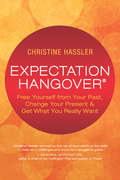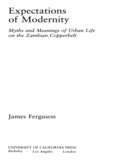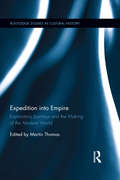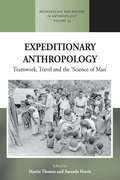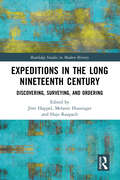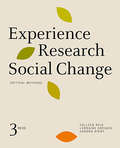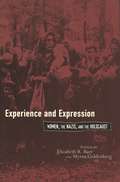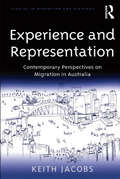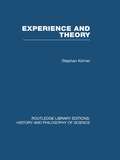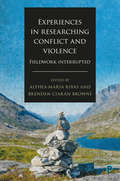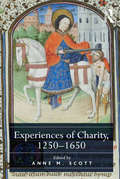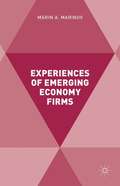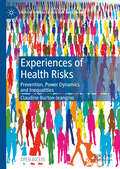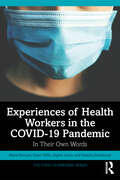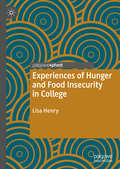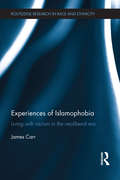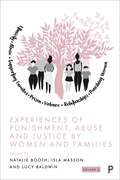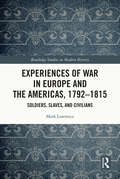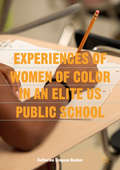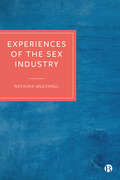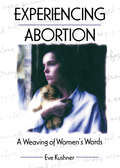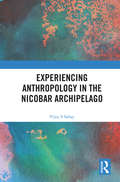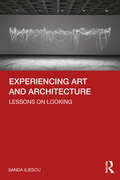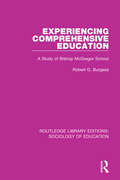- Table View
- List View
Expectation Hangover: Free Yourself from Your Past, Change Your Present and Get What You Really Want
by Christine HasslerWhen our expectations are met and things go according to plan, we feel a sense of accomplishment; we feel safe, in control, and on track. But when life does not live up to our expectations, we end up with an Expectation Hangover. This particular brand of disappointment is profoundly uncomfortable and can cost us valuable time and energy if not treated and leveraged effectively. Christine Hassler has broken down the complex and overwhelming experience of recovering from disappointment into a step-by-step treatment plan. This book reveals the formula for how to process Expectation Hangovers on the emotional, mental, physical, and spiritual levels to immediately ease suffering. Instead of wallowing in regret, self-recrimination, or anger, we can see these experiences as catalysts for profound transformation and doorways that open to possibility. Often it is only when life throws us a curveball (or several) that we look in a different direction and make room for the kinds of unexpected things that lead more directly to a life we love. By the time you finish this book, you’ll understand why your Expectation Hangover happened and have your own treatment plan — a clear course of action to pursue your goals while preventing future disappointment.
Expectations of Modernity
by James FergusonOnce lauded as the wave of the African future, Zambia's economic boom in the 1960s and early 1970s was fueled by the export of copper and other primary materials. Since the mid-1970s, however, the urban economy has rapidly deteriorated, leaving workers scrambling to get by. Expectations of Modernity explores the social and cultural responses to this prolonged period of sharp economic decline. Focusing on the experiences of mineworkers in the Copperbelt region, James Ferguson traces the failure of standard narratives of urbanization and social change to make sense of the Copperbelt's recent history. He instead develops alternative analytic tools appropriate for an "ethnography of decline." Ferguson shows how the Zambian copper workers understand their own experience of social, cultural, and economic "advance" and "decline." Ferguson's ethnographic study transports us into their lives--the dynamics of their relations with family and friends, as well as copper companies and government agencies. Theoretically sophisticated and vividly written, Expectations of Modernity will appeal not only to those interested in Africa today, but to anyone contemplating the illusory successes of today's globalizing economy.
Expedition into Empire: Exploratory Journeys and the Making of the Modern World (Routledge Studies in Cultural History #31)
by Martin ThomasExpeditionary journeys have shaped our world, but the expedition as a cultural form is rarely scrutinized. This book is the first major investigation of the conventions and social practices embedded in team-based exploration. In probing the politics of expedition making, this volume is itself a pioneering journey through the cultures of empire. With contributions from established and emerging scholars, Expedition into Empire plots the rise and transformation of expeditionary journeys from the eighteenth century until the present. Conceived as a series of spotlights on imperial travel and colonial expansion, it roves widely: from the metropolitan centers to the ends of the earth. This collection is both rigorous and accessible, containing lively case studies from writers long immersed in exploration, travel literature, and the dynamics of cross-cultural encounter.
Expeditionary Anthropology: Teamwork, Travel and the ''Science of Man'' (Methodology & History in Anthropology #33)
by Martin Thomas Amanda HarrisThe origins of anthropology lie in expeditionary journeys. But since the rise of immersive fieldwork, usually by a sole investigator, the older tradition of team-based social research has been largely eclipsed. Expeditionary Anthropology argues that expeditions have much to tell us about anthropologists and the people they studied. The book charts the diversity of anthropological expeditions and analyzes the often passionate arguments they provoked. Drawing on recent developments in gender studies, indigenous studies, and the history of science, the book argues that even today, the ‘science of man’ is deeply inscribed by its connections with expeditionary travel.
Expeditions in the Long Nineteenth Century: Discovering, Surveying, and Ordering (Routledge Studies in Modern History)
by Jörn Happel Melanie Hussinger Hajo RaupachThis book examines the processes of scientific, cultural, political, technical, colonial and violent appropriation during the 19th century. The 19th century was the century of world travel. The earth was explored, surveyed, described, illustrated, and categorized. Travelogues became world bestsellers. Modern technology accompanied the travelers and adventurers: clocks, a postal and telegraph system, surveying equipment, and cameras. The world grew together faster and faster. Previously unknown places became better known: the highest peaks, the coldest spots, the hottest deserts, and the most remote cities. Knowledge about the white spots of the earth was systematically collected. Those who made a name for themselves in the 19th century are still read today. Alexander von Humboldt or Charles Darwin made the epoch a scientific heyday. Ida Pfeiffer or Isabelle Bird (Bishop) traveled to distant continents and took their readers at home on insightful journeys. Hermann Vámbéry or Sir Richard Burton got to know the most remote languages and regions. There are countless travel reports about a fascinating century, which, with surveying and exploration, also brought colonial conquest and exploitation into the world. In ten individual studies, the authors explore travelers from all over the world and analyze their successes. The unifying element of all the studies is the experience of distance and its communication by means of travelogues to the armchair travelers who have stayed at home.This volume will be of value to students and scholars both interested in modern history, social and cultural history, and the history of science and technology.
Experience Research Social Change: Critical Methods, Third Edition
by Colleen Reid Lorraine Greaves Sandra KirbyExperience Research Social Change is a “how to” guide to research that also raises broader theoretical, methodological, and ethical questions. First published in 1989, it was the first critical methods book, and continues to inspire generations of researchers, students, and community workers. The third edition has been thoroughly revised, now containing twelve chapters organized into three parts: experience, research, and social change. The new edition also includes a wider range of examples from diverse researchers and topics that are woven throughout the text, including transdisciplinary research, sex and gender analysis, intersectional analysis, Indigenous methodologies, community-based research, digital and online approaches to research, ethical responsibilities and commitments, and knowledge translation.
Experience and Expression: Women, the Nazis, and the Holocaust
by Elizabeth R. Baer Myrna GoldenbergThe many powerful accounts of the Holocaust have given rise to women's voices, and yet few researchers have analyzed these perspectives to learn what the horrifying events meant for women in particular and how they related to them. In Experience and Expression, the authors take on this challenge, providing the first book-length gendered analysis of women and the Holocaust, a topic that is emerging as a new field of inquiry in its own right. Accessible to readers on many levels, the essays portray the experiences of women of various religious and ethnic backgrounds, and draw from the fields of English, religion, nursing, history, law, comparative literature, philosophy, French, and German. The collection explores an array of fascinating topics: rescue and resistance, the treatment of Roma and Sinti women, the fate of female forced laborers, Holocaust politics, nurses at so-called euthanasia centers, women's experiences of food and hunger in the camps, the uses and abuses of Anne Frank, and the representations of the Holocaust in art, film, and literature in the postwar era. The introduction provides a thorough overview of the current status of research in the field, and each essay seeks to push the theoretical boundaries that shape our understanding of women's experience and agency during the Holocaust and of the ways in which they have expressed their memories.
Experience and Representation: Contemporary Perspectives on Migration in Australia (Studies in Migration and Diaspora)
by Keith JacobsExperience and Representation: Contemporary Perspectives on Migration in Australia provides a critical overview of influential theoretical perspectives and recent empirical material in the fields of migration, race, culture and politics. With a primary focus on Australia, the book explores the complexities surrounding migration; sets out the most appropriate frameworks to understand ethnicity and racism; and assesses the utility of the concepts of globalisation, transnationalism and multiculturalism for interpreting contemporary society. Specific chapters explore the experiences of migrants within the context of urban environments; the vexed issue of national identity; the meaning of home; and the ways that migrants are currently represented in the media, literature and film. Experience and Representation will be of interest to scholars of migration and those studying social theory, politics and the media.
Experience and Theory: An Essay in the Philosophy of Science (Routledge Library Editions: History & Philosophy of Science)
by Stephan KornerOriginally published in 1966. This volume analyzes the general structure of scientific theories, their relation to experience and to non-scientific thought. Part One is concerned with the logic underlying empirical discourse before its subjection to the various constraints, imposed by the logico-mathematical framework of scientific theories upon their content. Part Two is devoted to an examination of this framework and, in particular, to showing that the deductive organization of a field of experience is by that very act a modification of empirical discourse and an idealization of its subject matter. Part Three analyzes the concordance between theories and experience and the relevance of science to moral and religious beliefs.
Experiences in Researching Conflict and Violence: Fieldwork Interrupted
by Althea-Maria Rivas and Brendan Ciarán BrowneThis international, edited collection brings together personal accounts from researchers working in and on conflict and explores the roles of emotion, violence, uncertainty, identity and positionality within the process of doing research, as well as the complexity of methodological choices. It highlights the researchers’ own subjectivity and presents a nuanced view of conflict research that goes beyond the ‘messiness’ inherent in the process of research in and on violence. It addresses the uncomfortable spaces of conflict research, the potential for violence of research itself and the need for deeper reflection on these issues. This powerful book opens up spaces for new conversations about the realities of conflict research. These critical self-reflections and honest accounts provide important insights for any scholar or practitioner working in similar environments.
Experiences of Charity, 1250-1650
by Anne M. ScottFor a number of years scholars who are concerned with issues of poverty and the poor have turned away from the study of charity and poor relief, in order to search for a view of the life of the poor from the point of view of the poor themselves. Great studies have been conducted using a variety of records, resulting in seminal works that have enriched our understanding of pauper experiences and the influence and impact of poverty on societies. If we return our gaze to ’charity’ with the benefit of those studies' questions, approaches, sources and findings, what might we see differently about how charity was experienced as a concept and in practice, at both community and personal levels? In this collection, contributors explore the experience of charity towards the poor, considering it in spiritual, intellectual, emotional, personal, social, cultural and material terms. The approach is a comparative one: across different time periods, nations, and faiths. Contributors pay particular attention to the way faith inflected charity in the different national environments of England and France, as Catholicism and Calvinism became outlawed and/or minority faith positions in these respective nations. They ask how different faith and beliefs defined or shaped the act of charity, and explore whether these changed over time even within one faith. The sources used to answer such questions go beyond the textual as contributors analyse a range of additional sources that include the visual, aural, and material.
Experiences of Emerging Economy Firms
by Marin MarinovExperiences of Emerging Economy Firms investigates the different elements of the experiences of emerging economy firms and sheds essential light on a large variety of aspects associated with their functioning in both home and host contexts. For example, firms must be able to overcome the liability of foreign and emerging issues when they expand their activities in various contexts, enter, exit and re-enter overseas markets; they have to overcome institutional barriers, adapt the cultural challenges in foreign markets, undergo the impact of large multinational firms from developed economies and experience the impact of home institutions and government policies. This groundbreaking and illuminating book presents issues of theoretical and practical significance, thus challenging existing paradigms of firm internationalization.
Experiences of Health Risks: Prevention, Power Dynamics and Inequalities (Critical Studies in Risk and Uncertainty)
by Claudine Burton-JeangrosThis book focuses on health risks, a domain in which risk expansion has been particularly prolific. As a result of massive gains in scientific knowledge, made possible by statistical developments, data accumulation and computerisation over the last decades, more and more attention has been geared towards risks in the fields of public health and medicine. Specifically directed towards concrete experiences of health risks, the book analyses the social contexts in which these experiences occur to understand how people, in their diverse positions, actually think, feel, act, and interact around experiences of risk. The author argues that recurrent debates about risk exist because most of the time the notion leaves aside the complexity of social processes surrounding actual experiences and interpretations of vulnerability and danger in society. This book will be of interest to students and scholars of sociology of health and medicine and risk studies, as well as health professionals and policy-makers facing the complexity of acting and deciding in the risk society.
Experiences of Health Workers in the COVID-19 Pandemic: In Their Own Words (The COVID-19 Pandemic Series)
by Sophie Lewis Karen Willis Marie Bismark Natasha SmallwoodExperiences of Health Workers in the COVID-19 Pandemic shares the stories of frontline health workers—told in their own words—during the second wave of COVID-19 in Australia. The book records the complex emotions healthcare workers experienced as the pandemic unfolded, and the challenges they faced in caring for themselves, their families, and their patients. The book shares their insights on what we can learn from the pandemic to strengthen our health system and prepare for future crises. The book draws on over 9,000 responses to a survey examining the psychological, occupational, and social impact of the COVID-19 pandemic on frontline health workers. Survey participants came from all areas of the health sector, from intensive care doctors to hospital cleaners to aged care nurses, and from large metropolitan hospitals to rural primary care practices. The authors organise these free-text responses thematically, creating a shared narrative of health workers experiences. Each chapter is prefaced by a brief commentary that provides context and introduces the the themes that emerged from the survey. This book offers a unique historical record of the experiences of thousands of healthcare workers at the height of the second wave of the pandemic and will be of great interest to anyone interested in the experiences of healthcare workers, and the psychological, organisational, healthcare policy, and social challenges of the COVID-19 pandemic.
Experiences of Hunger and Food Insecurity in College
by Lisa HenryThis volume explores the experience of hunger and food insecurity among college students at a large, public university in north Texas. Ninety-two clients of the campus food pantry volunteered to share their experiences through qualitative interviews, allowing the author to develop seven profiles of food insecurity, while at once exploring the impact of childhood food insecurity and various coping strategies. Students highlighted the issues of stigma and shame; the unwillingness to discuss food insecurity with their peers; the physical consequences of hunger and poor nutrition; the associations between mental health and nutrition; the academic sacrifices and motivations to finish their degree in the light of food insecurity; and the potential for raising awareness on campus through university engagement. Henry concludes the book with a discussion of solutions—existing solutions to alleviate food insecurity, student-led suggestions for additional resources, solutions in place at other universities that serve as potential models for similar campuses—and efforts to change federal policy.
Experiences of Islamophobia: Living with Racism in the Neoliberal Era (Routledge Research in Race and Ethnicity)
by James CarrSince 9/11 interest in Islamophobia has steadily increased – as has the number of academic publications discussing the phenomenon. However, theoretical expositions have dominated the field. Lived experiences of Islamophobia, by contrast, have received little attention. In recognition of the importance of addressing this imbalance, this book provides theoretically-informed analyses alongside everyday testimonies of anti-Muslim racism, set comparatively in an international context. Carr argues that the failure of the neoliberal state to collect data on anti-Muslim racism highlights the perpetuation of ‘race’ blindness within governance. Not only does this mean that the salience of racism is denied in the lives of those who experience it, but this also enables the state to absolve itself from challenging the issue and providing the necessary supports to Muslim communities. Offering original empirical research and theoretical engagement with the concept of ‘race’-blind neoliberal governance, this book will appeal to students and scholars across the social sciences, in addition to policymakers and activists working in this topical area.
Experiences of Punishment, Abuse and Justice by Women and Families: Volume 2
by Natalie Booth, Isla Masson and Lucy BaldwinWomen and families within the criminal justice system (CJS) are increasingly the focus of research and this book considers the timely issues concerning experiences of punishment, abuse and justice. With insights from frontline practice and from the lived experiences of women, the collection examines prison experiences in a post-COVID-19 world, domestic violence and the successes and failures of family support. A companion to the first edited collection, Critical Reflections on Women, Family, Crime and Justice, the book sheds new light on the challenges and experiences of women and families who encounter the CJS. Accessible to both academics and practitioners and with real-world policy recommendations, this collection demonstrates how positive change can be achieved.
Experiences of War in Europe and the Americas, 1792–1815: Soldiers, Slaves, and Civilians (Routledge Studies in Modern History)
by Mark LawrenceThis work seeks to offer a new way of viewing the French Wars of 1792–1815. Most studies of this period offer international, political, and military analyses using the French Revolution and Napoleon as the prime mover. But this book focuses on military and civilian responses to French Revolutionary and Napoleonic wars, throughout the rest of Europe and the Americas. It shows how the unprecedented mobilization of this era forged a generation of soldiers and civilians sharing a common experience of suffering, bequeathing the West with a new veteran sensibility. Using a range of sources, especially memoirs, this book reveals the adventure and suffering confronting ordinary soldiers campaigning in Europe and the Americas, and the burdens imposed on civilians enduring rising and falling empires across the West. It also reveals how the wars liberated slaves, serfs, and common people through revolutions and insurgencies.
Experiences of Women of Color in an Elite US Public School
by Catherine Simpson BuekerThis study explores the experiences of women of color who attended an elite, predominantly white public high school in the Northeastern United States through one of three points of entry: as town residents attending their local high school, or as commuter or boarding students via two distinct voluntary racial desegregation programs. Women in all three groups experience feelings of marginalization and stigma. At the same time, many also discuss the benefits of having lived in or attended school in this environment. Women developed strong internal bonds within and across their respective groups, some were able to racially diversify social networks and increase access to new forms of social capital through both their own initiatives and efforts on the part of adults in the school and community, and many also discuss the acquisition of elite forms of cultural capital that have served them into adulthood. Even with these general trends, point of access clearly mediates the experience, with geographic and symbolic boundaries varying by group.
Experiences of the Sex Industry
by Natasha MulvihillUsing unpublished email interviews collected for a Home Office project on the sex industry, this anthology presents the individual stories of sex workers and buyers in England and Wales, in their own words. The author Natasha Mulvihill also re-interviews the participants to reflect on their original interviews, their experience of engaging in research and of managing through the COVID-19 pandemic. Of interest to policymakers and students of criminology, sociology, social policy, law and qualitative methods, the text seeks to navigate through the difficult politics of the sex industry and re-focus our understanding on the lived experiences of those involved.
Experiencing 11 November 2018: Commemoration and the First World War Centenary
by Sumartojo ShantiIn a unique collection of international and interdisciplinary research, this book focuses on commemorative events around the world on the same day: 11 November 2018, the centenary of Armistice Day, the end of the First World War. It argues that we need to move beyond discourse, narrative and how historical events are represented to fully understand what commemoration does, socially, politically and culturally. Adopting an experiential reframing treats sensory, affective and emotional feelings as fundamental to how we collectively understand shared histories, and through them, shared identities. The volume features 15 case studies from ten countries, covering a variety of settings and national contexts specific to the First World War. Together the chapters demonstrate that a new conceptualisation of commemoration is needed: one that attends to how it feels.
Experiencing Abortion: A Weaving of Women's Words
by Eve KushnerIf you&’ve had an abortion and are feeling isolated and vulnerable, Experiencing Abortion will remind you that you are not alone and that you must feel your emotions in order to accept your choice and heal. Each woman responds to abortion in her own way, yet, as this sensitive, insightful book shows, there are many similarities among women&’s post-abortion emotions. Sharing in the firsthand, personal experiences of other women who speak for themselves in this book will help you come to terms with anguish, stress, grief, anger, or any other overwhelming emotions you might be feeling. Don&’t go on ignoring or blocking out your feelings. Learn to incorporate your experience into your sense of self in a healthy way.By reading Experiencing Abortion, you will learn about the multiple feelings and reactions abortion can trigger, the process of accepting an abortion, and the struggle to control fertility without treating your body as an enemy. Offering you a safe, honest, and supportive environment in which to explore your feelings about your abortion, this book discusses many important topics, including: the way moods can overtake you after abortion how avoiding your experience can defer acceptance, which in turn leads to denial and guilt how pregnancy, abortion, and subsequent bleeding can affect your perception of your body the struggle to enjoy sex after your abortion your heightened awareness of gender after an abortion how your intimate relationships may change after an abortion the psychological reasons you may sometimes forgo birth control accepting yourself after a second abortionExperiencing Abortion will help women who have had an abortion understand that it is a complex physical and emotional experience that doesn&’t necessarily end after a week or a month or a year. It will also help professionals in abortion facilities and therapists who offer pre- and post-abortion counseling understand how abortion affects each individual differently and how they might help women work through their feelings both before and after abortion. Partners, friends, and families will find this book helpful and informative as they try to help their loved one get through this sometimes difficult, even traumatic, experience.
Experiencing Anthropology in the Nicobar Archipelago
by Vijoy S SahayThis book explores the discipline of social-cultural anthropology through an extensive study of the Nicobarese people in one of the remotest human settlements of the Indian Ocean. It examines the social, cultural, economic, political and magico-religious beliefs of the Nicobarese, and traces their ritualistic upbringing from conception till after death. The book also discusses the nature-man-spirit complex observed in the life of the Nicobarese. The author further utilises this study to examine the complex role of anthropologists in maintaining objectivity and authenticity in ethnographic accounts, and discusses several critical epistemological issues concerning social-cultural anthropology as a field of study today. Based upon extensive field research by the author conducted over four decades, this volume will be of great interest to scholars and researchers of sociology and social-cultural anthropology, human geography, social sciences, minority studies, as well as South Asian studies.
Experiencing Art and Architecture: Lessons on Looking
by Sanda IliescuIn this multidisciplinary book, Sanda Iliescu articulates a rich, multi-faceted approach to the aesthetic experience. Through in-depth discussions of her own lived encounters with art, architecture, and the world around her, she advocates a way of looking that blends sensory perception, formal analysis, social and political consciousness, and personal memory. Focusing special attention on the aesthetic concept of the figure-ground problem, the author challenges this foundational principle’s presumed hierarchies and shows how a new and more dynamic understanding of it can enhance our way of looking at and understanding art and architecture. Works discussed in the book include a wide range of contemporary and historic art and architecture, among them artworks by Rembrandt, Matisse, Eva Hesse, and David Hammons; architecture by Zaha Hadid, Peter Zumthor, and Weiss/Manfredi; and non-Western works such as a thirteenth-century Chinese vase and the Ryōanji dry garden in Kyoto, Japan. Personal and engaging, this book is for a wide audience of those practicing, studying, or with an interest in the creative fields, from beginners to seasoned professionals.
Experiencing Comprehensive Education: A Study of Bishop McGregor School (Routledge Library Editions: Sociology Of Education Ser.)
by Robert G. BurgessIn this study, first published in 1983, Robert Burgess discusses the definitions, redefinitions, strategies and bargains used in and out of classrooms by teachers and pupils in a co-educational Roman Catholic school where he spent some time as a researcher and part-time teacher. He also looks at the role of the school’s headmaster, and his conception of the school, and at the house and departmental staff.This absorbing study will be of interest to teachers and students of sociology and education, practicing and prospective school teachers, researchers, administrators, policy makers and others who are concerned with schools and schooling.
